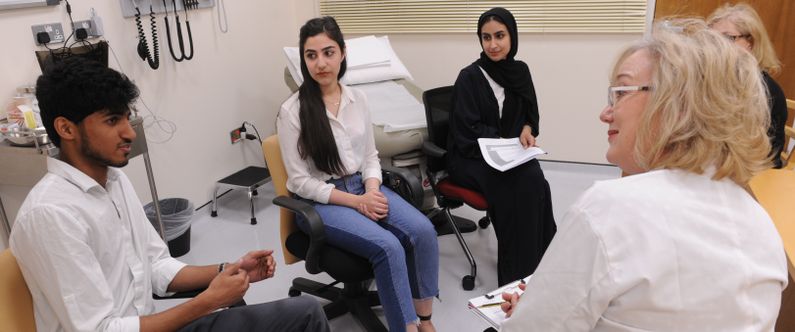First ever pre-med simulation exercise a hit with students
 Pre-med 2 students take part in the simulation exercise with standardized patients.
Pre-med 2 students take part in the simulation exercise with standardized patients.
Students who participated in the pre-medical curriculum’s first-ever simulation-based training exercise gave the new initiative a resounding vote of approval.
Forty-eight pre-medical students engaged in a role-play scenario in the Clinical Skills and Simulation Lab (CSSL) as part of the Foundation of Ethics course on the second year of the pre-medical curriculum.
The session required the students to work with standardized patients (SPs) to act out a scenario in which family members disagree over whether their mother is well enough to undergo knee surgery she needs.
Pre-med 2 student Nasser Al-Khawaga said: “It was a really useful session. To me it felt genuine – like something we would experience in the future.”
Fellow pre-med 2 student Hamda Al-Mansoori added: “The role play scenario was very good at helping us to understand issues from a different perspective. I think it gave us a really meaningful insight into the group decisions that family members often have to take.”
The Foundation of Ethics Course is designed to introduce students to the moral dimension of medicine. Prior to the simulation exercise, the students read Franz Kafka’s The Metamorphosis and discussed the ethical and moral themes of the work.
Dr. Pablo Rodriguez del Pozo, associate professor of medical ethics in medicine, said: “This is a novel and very exciting approach to the teaching of medical ethics here at WCM-Q. Using a simulated scenario allows us to show students how the theoretical principles of medical ethics are made operational and applied to real-world situations.”
Dr. Dora Stadler, clinical assistant professor of medicine, was instrumental in the design and delivery of the simulation exercise. She said: “The students contributed greatly to the success of this session; they were prepared , professional and took their roles seriously. With this approach, we believe the students can have a realistic exposure to ethical dilemmas patients and families face.
She added: “This activity provides insights into the complicated nature of the physician-patient-family relationship and provides communication tools that students can later apply to successfully negotiate similar clinical encounters in the medical curriculum and beyond.”
Dr. Stadler gave thanks to the CSSL team for their hard work to ensure the success of the session, and to the “outstanding” SPs who took part.
Research has shown that simulation-based learning can be highly effective at helping students acquire problem-solving abilities and practical skills. It is already used extensively in WCM-Q’s four-year medical curriculum, where it has been both effective and popular with students. This success spurred WCM-Q to introduce simulation-based learning to the Pre-medical curriculum.
Dr. Marco Ameduri, associate dean for pre-medical education, said: “Simulation-based learning is a powerful pedagogical tool that can be extremely effective for the development of practical skills and communication skills, both of which are of course vitally important in the medical profession. We are very pleased that we can now offer these highly effective learning experiences to pre-medical students and that the first group of students to benefit responded with such positivity.”